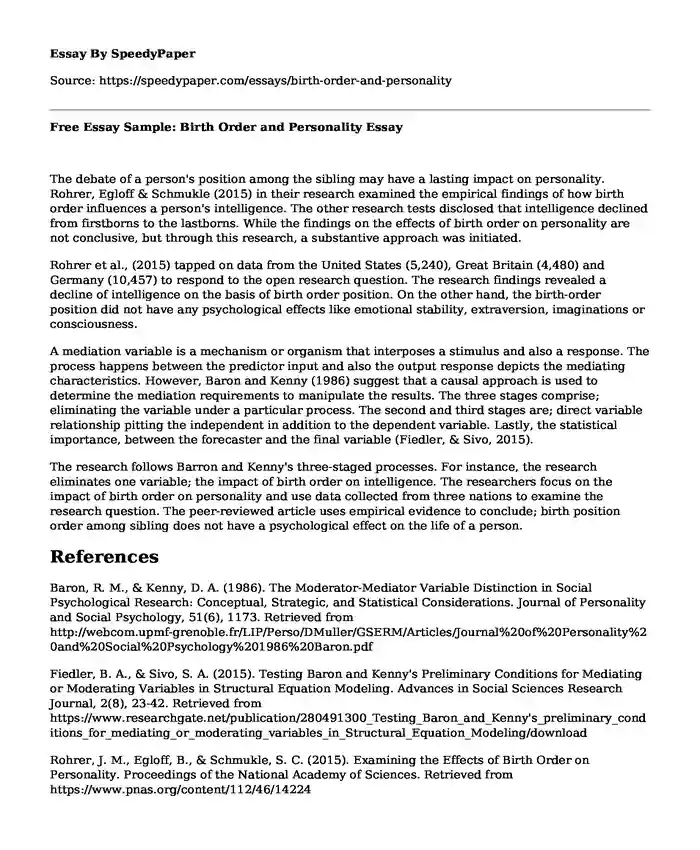
| Type of paper: | Essay |
| Categories: | Anthropology Intelligence Family Personality Human development |
| Pages: | 2 |
| Wordcount: | 421 words |
The debate of a person's position among the sibling may have a lasting impact on personality. Rohrer, Egloff & Schmukle (2015) in their research examined the empirical findings of how birth order influences a person's intelligence. The other research tests disclosed that intelligence declined from firstborns to the lastborns. While the findings on the effects of birth order on personality are not conclusive, but through this research, a substantive approach was initiated.
Rohrer et al., (2015) tapped on data from the United States (5,240), Great Britain (4,480) and Germany (10,457) to respond to the open research question. The research findings revealed a decline of intelligence on the basis of birth order position. On the other hand, the birth-order position did not have any psychological effects like emotional stability, extraversion, imaginations or consciousness.
A mediation variable is a mechanism or organism that interposes a stimulus and also a response. The process happens between the predictor input and also the output response depicts the mediating characteristics. However, Baron and Kenny (1986) suggest that a causal approach is used to determine the mediation requirements to manipulate the results. The three stages comprise; eliminating the variable under a particular process. The second and third stages are; direct variable relationship pitting the independent in addition to the dependent variable. Lastly, the statistical importance, between the forecaster and the final variable (Fiedler, & Sivo, 2015).
The research follows Barron and Kenny's three-staged processes. For instance, the research eliminates one variable; the impact of birth order on intelligence. The researchers focus on the impact of birth order on personality and use data collected from three nations to examine the research question. The peer-reviewed article uses empirical evidence to conclude; birth position order among sibling does not have a psychological effect on the life of a person.
References
Baron, R. M., & Kenny, D. A. (1986). The Moderator-Mediator Variable Distinction in Social Psychological Research: Conceptual, Strategic, and Statistical Considerations. Journal of Personality and Social Psychology, 51(6), 1173. Retrieved from http://webcom.upmf-grenoble.fr/LIP/Perso/DMuller/GSERM/Articles/Journal%20of%20Personality%20and%20Social%20Psychology%201986%20Baron.pdf
Fiedler, B. A., & Sivo, S. A. (2015). Testing Baron and Kenny's Preliminary Conditions for Mediating or Moderating Variables in Structural Equation Modeling. Advances in Social Sciences Research Journal, 2(8), 23-42. Retrieved from https://www.researchgate.net/publication/280491300_Testing_Baron_and_Kenny's_preliminary_conditions_for_mediating_or_moderating_variables_in_Structural_Equation_Modeling/download
Rohrer, J. M., Egloff, B., & Schmukle, S. C. (2015). Examining the Effects of Birth Order on Personality. Proceedings of the National Academy of Sciences. Retrieved from https://www.pnas.org/content/112/46/14224
Cite this page
Free Essay Sample: Birth Order and Personality. (2023, Jan 23). Retrieved from https://speedypaper.com/essays/birth-order-and-personality
Request Removal
If you are the original author of this essay and no longer wish to have it published on the SpeedyPaper website, please click below to request its removal:
- Advantages of the Internet Essay Samples
- What Is Divorce - Essay Sample for Everyone to Check
- Essay Sample on Roselily by Alice Walker and Sweat by Zora Neale Hurston
- Liquid Biopsy for Cancer, Free Essay in Medicine
- Lost in Transition Short Paper Sample
- Essay Example about National Health Policy
- Free Essay Example on Professional Accountability in Higher Education
Popular categories




